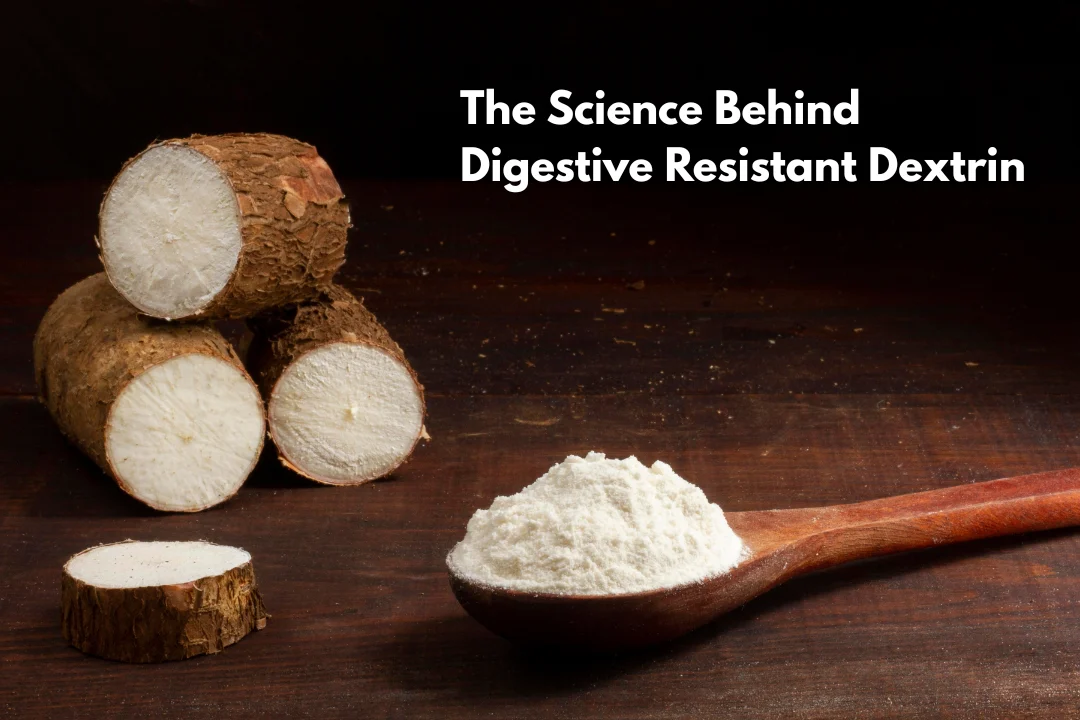The Science Behind Digestive Resistant Dextrin: Fermentation, Solubility, and Digestive Impact
May 7, 2025

Why are formulators increasingly turning to resistant dextrin for their next functional product innovation? The answer lies in the compound’s scientifically validated benefits, especially for digestive health and product stability. The science behind digestive resistant dextrin unveils its value not just as a soluble dietary fiber but also as a highly versatile, prebiotic ingredient. In today’s health-focused landscape, manufacturers must go beyond traditional fibers to find solutions that enhance wellness without compromising formulation ease. Resistant dextrin answers that call.
This article explores the biology and chemistry that make resistant dextrin uniquely beneficial, addressing common questions around fermentation, solubility, digestive tolerance, and food application
What is Digestive Resistant Dextrin?
Resistant dextrin is a low-viscosity, water-soluble dietary fiber created through enzymatic hydrolysis of starch. During this process, starch molecules are broken down into smaller chains that resist digestion in the small intestine, classifying them as “resistant” to enzymatic activity.
Molecular Structure and Classification
Structurally, resistant dextrin consists of glucose polymers with a mix of glycosidic linkages that limit rapid digestion. As a result, it passes into the colon largely intact, where it is fermented by the gut microbiota. It is classified as a type V resistant starch, specifically engineered for its high digestive tolerance and functional stability.
Fermentation: Feeding the Microbiota, Fueling Gut Health
One of resistant dextrin’s primary health benefits lies in its prebiotic fermentation in the colon. Unlike fibers that are rapidly fermented (causing bloating), resistant dextrin is slowly and selectively fermented, making it gentler on digestion.
Microbiota Modulation
This fermentation process encourages the growth of beneficial bacteria such as Bifidobacteria and Lactobacilli. These microbes support a balanced gut ecosystem and contribute to improved digestion, immune function, and nutrient absorption. The selective fermentation also limits the growth of gas-producing or pathogenic bacteria, reducing side effects like bloating or flatulence.
Production of Short-Chain Fatty Acids (SCFAs)
As resistant dextrin undergoes fermentation, it leads to the production of short-chain fatty acids (SCFAs), especially butyrate, acetate, and propionate.
SCFAs and Their Health Impacts
- Butyrate is a key fuel for colonocytes, supporting the intestinal lining and reducing inflammation.
- Propionate is absorbed into the liver and may help regulate cholesterol and glucose metabolism.
- Acetate plays a role in systemic energy regulation and supports overall metabolic function.
These SCFAs contribute to immune modulation, intestinal pH regulation, and the maintenance of barrier integrity in the gut, making resistant dextrin a powerful tool for long-term digestive wellness.
Solubility and Functional Advantages in Food Systems
One of resistant dextrin’s biggest formulation advantages is its excellent solubility in both cold and hot liquids. Whether incorporated into RTD beverages, dry powdered mixes, or functional gummies, it dissolves clearly and maintains a smooth texture.
Use in Functional Foods
- Ready-to-drink (RTD) beverages benefit from its clear dispersion.
- Supplement powders like protein or fiber mixes can include resistant dextrin for gut health benefits.
- Fortified juices and flavored waters gain additional functional value without altering mouthfeel.
Its neutral taste and odor make it ideal for wide-ranging applications.
Low Viscosity, High Stability
Unlike many other fibers, resistant dextrin maintains a low viscosity, which allows for higher dosing without changing the consistency of the final product.
Thermal and pH Stability
It remains stable under high temperatures and across a broad pH range, enabling use in baked goods, acidic beverages, and heat-processed foods. This thermal resistance means it won’t degrade or lose function during cooking or pasteurization.
Digestive Tolerance and Prebiotic Function
One of the most significant benefits for consumers is that resistant dextrin offers high digestive tolerance. Unlike inulin or FOS (fructooligosaccharides), which may cause bloating or gas in sensitive individuals, resistant dextrin is slowly fermented, making it gentler and better suited for mainstream consumption.
Ideal for Daily Use
Consumers can consume products enriched with resistant dextrin multiple times a day without discomfort, making it ideal for everyday gut health products, especially those marketed to general wellness seekers rather than niche dietary users.
Application Examples from the Industry
Functional Waters
Enhanced hydration drinks that include resistant dextrin, electrolytes, and vitamins to promote gut health without calories or sugar.
Gut-Friendly Dairy and Plant-Based Yogurts
Probiotic-rich products paired with resistant dextrin for synergistic support to microbiota.
Meal Replacement Powders
Combining protein, vitamins, and resistant dextrin to increase satiety and digestive regularity.
Gummy Supplements
Chewable fiber supplements containing resistant dextrin provide fiber and prebiotic benefits in a pleasant format.
Blood Sugar-Friendly Snack Bars
Bars formulated with resistant dextrin to slow glucose absorption, supporting glycemic balance and sustained energy.
How Does Resistant Dextrin Compare to Other Fibers?
When compared with other popular dietary fibers, resistant dextrin stands out in several ways:
- Vs. Inulin: Less gas production, higher tolerance
- Vs. Psyllium: Lower viscosity, easier to formulate
- Vs. Cellulose: Soluble and fermentable
This balance between functionality and tolerance makes it one of the most versatile fibers in product development.
A Science-Backed Fiber for Future-Forward Formulation
The science behind digestive resistant dextrin reveals why this fiber is gaining momentum in food and supplement innovation. With its solubility, fermentation profile, and digestive impact, resistant dextrin supports gut health without the downsides seen in other fibers. It enables high-performing, clean-label, and consumer-friendly formulations that meet the evolving demands of today’s health-focused market.
At Satoria Nutrisentials, we provide premium resistant dextrin solutions that help brands develop scientifically validated products for digestive wellness.